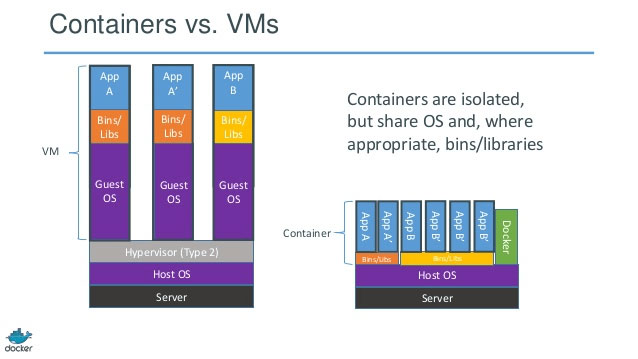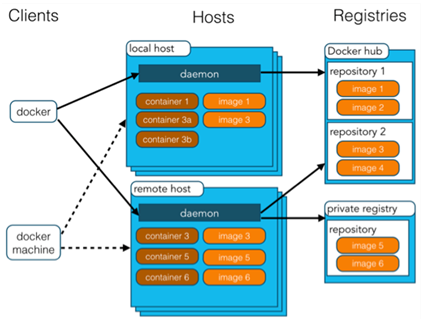
Docker is a tool designed to make it easier to create, deploy and run applications using containers. Containers allow a developer to package up an application with all of the parts it needs, such as libraries and other dependencies, and ship it all out as one package. The application will run on any other Linux machine.
Linux containers have applications which keep them isolated from the host system that they run on. It allows a developer to package up an application with all of the parts it needs – like libraries and other dependencies – and ship it all out as one package. Unlike creating a whole virtual operating system, containers don’t need to replicate an entire operating system. Only the individual components needed for operation have to be replicated for containers.
Docker is a command-line tool to programmatically define the contents of a Linux container in code, which can then be versioned, reproduced, shared, and modified easily just as if it were the source code to a program.
This can be explained by the example of an inter-model-shipping-container, which can be used to transport various things, through various transportation medium. Docker functions the same way as this shipping container. Docker is an engine that enables any payload to be encapsulated as a lightweight, portable, self-sufficient-container which can be manipulated using standard operations and run consistently on any hardware platform, virtually.
Now we can compare docker and virtual machines:

- Virtual machines have a full OS with its own memory management installed with the associated overhead of virtual device drivers.
- Docker containers are executed by the Docker engine rather than the hypervisor.
- In virtual machines, valuable resources are emulated for the guest OS and hypervisor, which makes it possible to run many instances of one or more operating systems in parallel on a single machine.
- Containers are smaller than Virtual Machines and enable faster start up with better performance, less isolation and greater compatibility possible due to sharing of the host’s kernel.
- Docker Containers are able to share a single kernel as well as application libraries.
- Containers present a lower system overhead than Virtual Machines and performance of the application inside a container is generally same or better as compared to the same application running within a Virtual Machine.
- As compared to virtual machines, containers can be faster and less resource heavy as long as the user is willing to stick to a single platform to provide the shared OS.
- A virtual machine could take up several minutes to create and launch whereas a container can be created and launched just in a few seconds.
- An Application running in a container can go twice as fast as one in a virtual machine.
Let’s have a look at Docker architecture:
Docker utilizes a client-server architecture and a remote API to manage and create Docker containers and images. Docker containers are created from Docker images. The relationship between containers and images are analogous to the relationship between objects and classes in object-oriented programming, where the image describes the container and the container is a running instance of the image.

Docker Image – Recipe or template for creating docker containers. It includes the steps for installing and running software.
Docker Container – A tiny virtual machine that is created from the instructions found within the Docker image.
Docker Client – Command-line utility / another tool that takes advantage of the Docker API (https://docs.docker.com/reference/api/docker_remote_api) to communicate with a docker daemon.
Docker Host – A physical/virtual machine that is running a Docker daemon and contains cached images as well as runnable containers created from images.
Docker Registry – Repository of docker images that can be used to create Docker containers. The most popular example is Docker Hub (https://hub.docker.com).
Docker Machine – A utility for managing multiple Docker hosts, which can run locally in VirtualBox or remotely in a cloud hosting service like AWS, Microsoft Azure, Google cloud platform, Digital Ocean, etc.
Compared to any other technologies, docker can get more applications running on the same hardware. Docker makes it easier for developers to quickly create ready-to-run container applications; and to manage and deploy applications. This explains why Docker is extremely popular as an enterprise technology, making any company to go for it on moving their server applications to containers.
